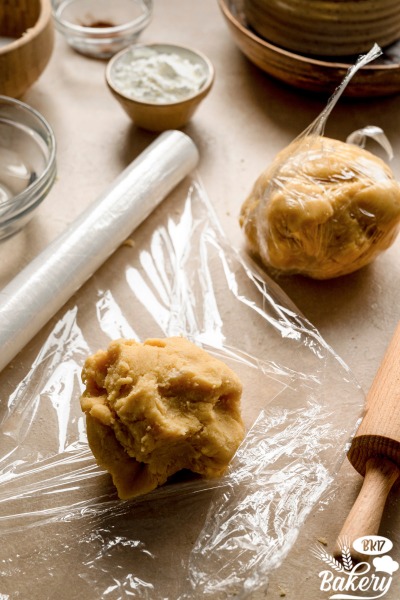Cookie dough is a delightful treat that’s hard to resist, whether you’re whipping classic chocolate chip cookies or indulging in more exotic flavors. But have you ever found yourself wondering just how long can cookie dough last in the fridge before it loses its charm?
Understanding the shelf life of refrigerated cookie dough is essential for both safety and for creating scrumptious baked goods.
In This Article
How Long Does Cookie Dough Last In The Fridge?

Cookie dough typically lasts in the refrigerator for about 3 to 5 days or even 7 days at max. The exact duration depends on several factors, such as the ingredients used, the freshness of the ingredients, and the storage conditions.
Dough containing perishable items like cream cheese or fresh fruit may spoil more quickly than basic chocolate chip cookie dough. After years of baking, I found that the freshness of the ingredients used also matters; using fresh eggs and quality butter can contribute to a longer shelf life.
How To Properly Store Cookie Dough In The Fridge
Besides other factors mentioned above, proper storage is essential in extending the life of cookie dough in the fridge. Let me tell you a secret that I have learned from my mom about storing raw cookie dough that can last for days.
- Step 1: Transfer the cookie dough from its original mixing bowl to an airtight container. This prevents the dough from drying out, absorbing odors, or picking up flavors from other foods in the fridge. When I don’t have an airtight container on hand, I wrap the dough tightly in plastic wrap. Be sure to cover it completely to prevent air exposure.
- Step 2: Label the container with the date you prepared the dough. This helps you keep track of its freshness.
- Step 3: Place the airtight container or wrapped dough in the coldest part of the refrigerator, typically on a shelf, not in the door. The ideal temperature is around 36-40°F (2-4°C).
Can Cookie Dough Go Bad?

Yes, cookie dough can go bad. Like any food product, homemade dough is susceptible to spoilage if not stored and handled properly.
The primary concern with cookie dough is the potential growth of harmful bacteria, such as Salmonella, which can be present in raw eggs. When the dough contains raw eggs and is left at room temperature for an extended period, the risk of bacterial growth increases.
How To Tell If Cookie Dough Is Bad?
When your unbaked cookie dough has been stored in the refrigerator for too long, it can develop off-flavors, an odd texture, or even start to show signs of mold. This is especially true when the dough is improperly sealed in an airtight container or contains perishable ingredients like cream cheese or fresh fruit.
As a normal person, I can be quite forgetful sometimes. Once, I accidentally forgot and left my homemade cookie dough in the back of the fridge for more than 1 week.
And the results, you guessed it: my bowl of dough appeared moldy and I had to get rid of the whole batch. So, be mindful whenever you have delicious leftover dough waiting in the fridge. Also, always check for signs of spoilage before using the dough.
Alternative Method To Preserve Cookie Dough: Freezing
There is no distinction between homemade and store-bought cookie dough when using this freezing method. Here is my way of freezing that you can apply after you have prepared the dough after your favorite recipe.
- Step 1: Divide the dough into individual portions, typically the size of one cookie. This step makes it convenient to defrost and bake only the number of cookies you need.
- Step 2: Shape the portions of dough into balls or whatever shape you prefer. Place each dough ball on a baking sheet lined with parchment paper to prevent sticking, then partially freeze the raw dough. This helps maintain the shape during final storage.
- Step 3: Once the dough portions are slightly firm, wrap each one tightly in plastic wrap or use a double layer of plastic wrap to ensure no air or moisture gets in. Alternatively, you can use airtight containers or resealable freezer bags. Label the wrapping with the date so you can track how long it has been frozen.
- Step 4: Place the wrapped dough portions in a freezer-safe bag, container, or airtight container, and remove as much air as possible to prevent freezer burn. Store the batch of dough in the coldest part of the freezer.

Since I don’t always eat my cookies right once, I bake some of them and freeze the rest. By baking them beforehand, I can store them in the freezer for 8-12 months.
They taste exactly the same as the day you made them and can defrost flawlessly at room temperature. Using this method, my family and I can enjoy homemade cookies whenever we want! How convenient!
Frequently Asked Questions
How Do You Moisten Refrigerated Cookie Dough?
To moisten refrigerated cooking dough, let it sit at room temperature briefly, then add a small amount of liquid (e.g., milk, water, or beaten egg) gradually, mixing gently until the desired consistency is reached. Still, be cautious; do not over-moisten, as it may affect the cookie texture.
Should I Defrost Frozen Cookie Dough?
Yes, you should defrost frozen dough before baking. Allow it to thaw in the refrigerator for several hours or overnight. This ensures even baking and prevents cookies from spreading excessively.
Does Refrigerating Cookie Dough Make It Less Sticky?
Yes, refrigerating cookie dough can make it less sticky. Chilling the dough firms up the fats (e.g., butter) in the cookie recipe, making it easier to handle. This can help shape and prevent the dough from sticking to your hands or rolling pin.
Final Words
In the world of baking, knowledge is our greatest ally, ensuring we savor every delectable bite. So, remember how long you can refrigerate cookie dough to ensure the best result. While cookie dough can last up to 1 week (preferably 3-5 days) in the refrigerator, proper storage and careful observation of any signs of spoilage are crucial.
Now armed with this insight, you’re ready to create perfect, freshly baked treats every time. Happy baking!








